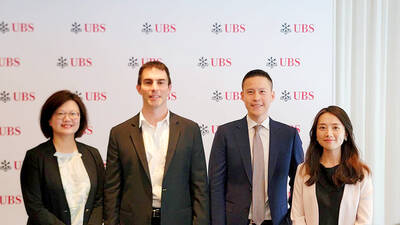Lion Travel Service Co Ltd (雄獅旅行社), one of the nation’s biggest travel agencies, aims to boost its market share of outbound travel business in Taiwan to between 30 percent and 35 percent within five years, after launching a new subsidiary to expand its client base later this year.
Based on the travel agency’s internal statistics, a total of 1.3 million outbound travelers in Taiwan booked tours, flights or hotels for their overseas trip through Lion Travel last year, which translates into between 12 and 14 percent of the market.
However, aiming to be a travel agency capable of expanding into the global market, Lion Travel chairman Jason Wang (王文傑) said he expects the company to boost its market turnover to between 30 percent and 35 percent in the next five years.
“To meet the goal, the company has to build up a platform offering products with higher diversification,” Wang told a news conference before the company’s annual party yesterday.
Lion Travel launched an investment holding company earlier this week, which may serve as a platform providing Lion Travel products, Wang said, adding that the platform may even sell tours offered by its peers eventually.
In addition to its core business in Taiwan, Lion Travel is accelerating the pace of its development in China, hoping to gain approval to conduct outbound and domestic tourism business for Chinese travelers soon.
The company has invested US$20 million to launch related businesses in the Shanghai free-trade zone, aiming to get the required licenses to allow it to start outbound and domestic tourism businesses in China.

TECH TITAN: Pandemic-era demand for semiconductors turbocharged the nation’s GDP per capita to surpass South Korea’s, but it still remains half that of Singapore Taiwan is set to surpass South Korea this year in terms of wealth for the first time in more than two decades, marking a shift in Asia’s economic ranks made possible by the ascent of Taiwan Semiconductor Manufacturing Co (TSMC, 台積電). According to the latest forecasts released on Thursday by the central bank, Taiwan’s GDP is expected to expand 4.55 percent this year, a further upward revision from the 4.45 percent estimate made by the statistics bureau last month. The growth trajectory puts Taiwan on track to exceed South Korea’s GDP per capita — a key measure of living standards — a

Samsung Electronics Co shares jumped 4.47 percent yesterday after reports it has won approval from Nvidia Corp for the use of advanced high-bandwidth memory (HBM) chips, which marks a breakthrough for the South Korean technology leader. The stock closed at 83,500 won in Seoul, the highest since July 31 last year. Yesterday’s gain comes after local media, including the Korea Economic Daily, reported that Samsung’s 12-layer HBM3E product recently passed Nvidia’s qualification tests. That clears the components for use in the artificial intelligence (AI) accelerators essential to the training of AI models from ChatGPT to DeepSeek (深度求索), and finally allows Samsung

READY TO HELP: Should TSMC require assistance, the government would fully cooperate in helping to speed up the establishment of the Chiayi plant, an official said Taiwan Semiconductor Manufacturing Co (TSMC, 台積電) yesterday said its investment plans in Taiwan are “unchanged” amid speculation that the chipmaker might have suspended construction work on its second chip packaging plant in Chiayi County and plans to move equipment arranged for the plant to the US. The Chinese-language Economic Daily News reported earlier yesterday that TSMC had halted the construction of the chip packaging plant, which was scheduled to be completed next year and begin mass production in 2028. TSMC did not directly address whether construction of the plant had halted, but said its investment plans in Taiwan remain “unchanged.” The chipmaker started

LOOKING BRIGHT: Taiwanese tech stocks have been trading at 18 to 19 times earnings, beating the 15 percent long-term average amid AI-driven optimism, an analyst said Taiwan’s economy could expand by as much as 5 percent this year, fueled by its technology manufacturing edge amid a global artificial intelligence (AI) boom, while tariff exemptions on semiconductor products keep the country’s levy burden low despite a headline rate of 20 percent, UBS Investment Bank said yesterday. “Although Washington has imposed a 20 percent tariff on goods from Taiwan, exemptions for semiconductors keep the weighted average low,” UBS senior economist for Asia and China William Deng (鄧維慎) said. The growth momentum is expected to extend into next year, with technology companies’ revenue projected to rise 17 percent, UBS research head